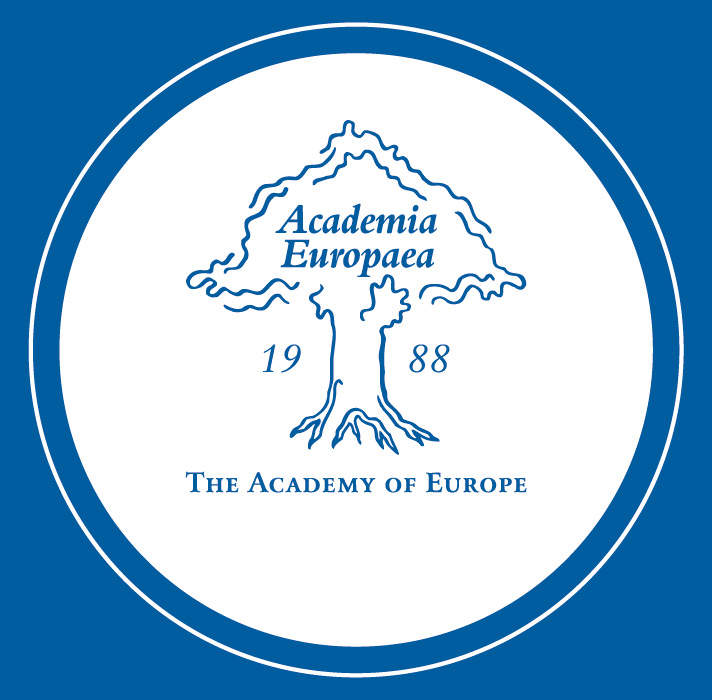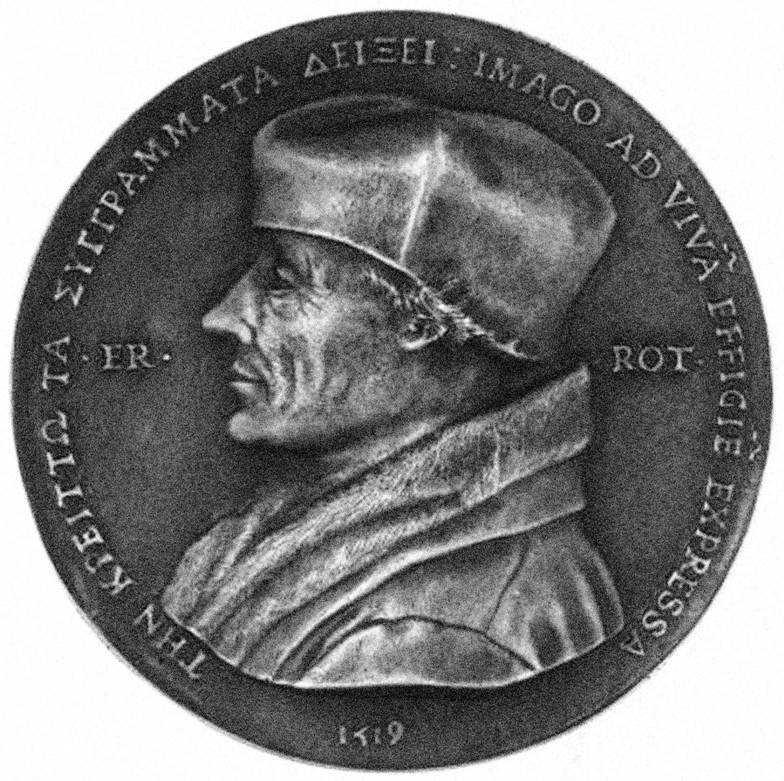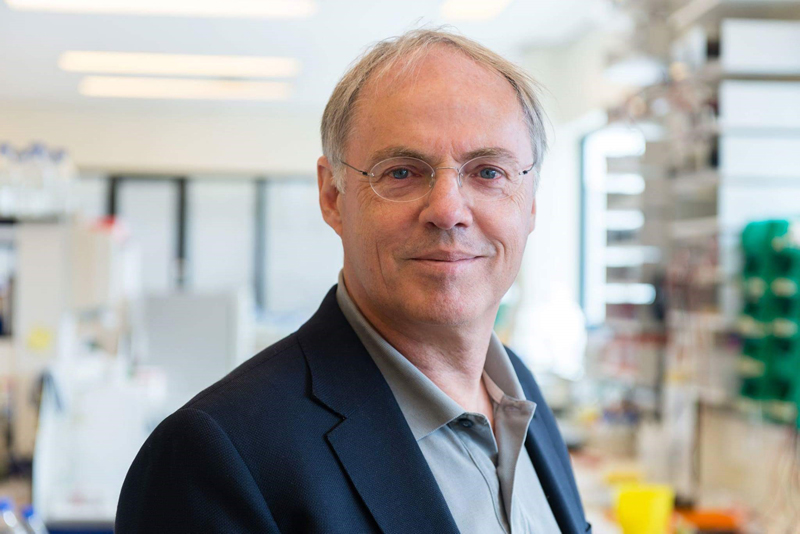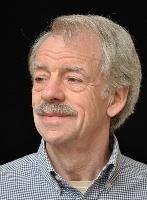Academia Europaea
The Academy of Europe#
An award of the Academia Europaea Erasmus Medal,
Thursday 29 November 2018, at the Cosmo Caixa conference centre and museum, Barcelona#
The Council of the Academia Europaea are pleased to award the Erasmus Medal to the internationally renowned molecular geneticist
Professor Hans C. Clevers MAE, University of Utrecht#
The Erasmus Medal of the Academia Europaea is awarded on the recommendation of the Council, to a member who has maintained over a sustained period, the highest level of international scholarship and recognition by peers.
Professor Clevers will deliver the 2018 Heinz-Nixdorf Erasmus Lecture:
Stem Cell-based organoids as avatars in human disease#
Sponsored by
The laudation will be given by Professor Jos W.M. van der Meer MAE, Radboud University Nijmegen
Professor Hans C. Clevers#
AFFILIATION:
Professor of Molecular Genetics at the University of Utrecht
Hubrecht Institute of the Royal Netherlands Academy of Arts and Sciences
Research Director of the Princess Maxima Center for Pediatric Oncology
LINK TO WEBPAGE:
https://www.hubrecht.eu/nl/research-groups/clevers-groep
TITLE OF PRESENTATION:
Stem Cell-based organoids as avatars in human disease
ABSTRACT OF PRESENTATION:
Hubrecht Institute, Royal Netherlands Academy of Arts and Sciences & University Medical Centre Utrecht, Uppsalalaan 8, 3584 CT Utrecht, the Netherlands
Stem cells are the foundation of all mammalian life. Stem cells build and maintain our bodies throughout life. Two types of stem cells are discerned.
1) Embryonic stem cells (ES cells) are briefly present in the early human or mouse embryo, a few days after fertilization. These ES cells can be grown indefinitely in the lab and have the potential to build each and every tissue in our body. Because of this ‘pluripotency’, ES cells hold great promise for therapeutic application in the field of regenerative medicine. However, derivation of ES cells leads to the destruction of the (mouse/human) embryo. This has caused intense debates from ethical, religious and logistical perspectives. A recent development circumvents the destruction of embryos. It is now possible to take skin cells (or other cells) from adults and convert these in the lab into cells with ES properties, so called iPS cells. Many of the hurdles that ES cell technology have faced, do not exist for iPS cells.
Neither ES cells, nor iPS cells play a significant role yet in the clinic.
2) Adult stem cells. Every organ in our body is believed to harbor its own dedicated stem cells. These adult stem cells replace tissue that is lost due to wear and tear, trauma and disease. Adult stem cells are highly specialized and can only produce the tissue in which they reside; they ae ‘multipotent’. Examples are bone marrow stem cells that make all blood cells, skin stem cells and gut stem cells. Even the brain is now known to harbor its specialized stem cells. The adult stem cells allow us to live 80-90 years, but this comes at a cost: they are the cells that most easily transform into cancer cells.
We have identified a gene (lgr5) that marks a series of known and novel adult stem cells, in organs such as the gut, the liver, the lung and the pancreas. We have learned to grow these stem cells in a dish into mini-versions of the human organs from which they derive. This so called organoid technology opens a range of avenues for the study of development, physiology and disease, and for personalized medicine. In the long run, cultured mini-organs may replace transplant organs from donors and hold promise in gene therapy.
BIOGRAPHICAL NOTE#
Hans Clevers (1957)
Hans Clevers obtained his MD degree in 1984 and his PhD degree in 1985 from the University Utrecht, the Netherlands. His postdoctoral work (1986-1989) was done with Cox Terhorst at the Dana-Farber Cancer Institute of the Harvard University, Boston, USA.
From 1991-2002 Hans Clevers was Professor in Immunology at the University Utrecht and, since 2002, Professor in Molecular Genetics. From 2002-2012 he was director of the Hubrecht Institute in Utrecht. From 2012-2015 he was President of the Royal Netherlands Academy of Arts and Sciences (KNAW). Since June 1, 2015 he is Director Research of the Princess Maxima Center for pediatric oncology. He continues to run his lab in the Hubrecht Institute.
Throughout his career, he has worked on the role of Wnt signalling in stem cells and cancer. His discoveries include TCF as the nuclear Wnt effector, the role of Wnt in adult stem cell biology and of Wnt pathway mutations in colon cancer, Lgr5 as a marker of multiple novel types of adult stem cells and as receptor for the Wnt-amplifying R-spondins, and –finally- a method to grow ever-expanding mini-organs (‘organoids’) from Lgr5 stem cells derived from a range of healthy or diseased human tissues. This has led to over 600 publications and >70,000 citations
Hans Clevers is member of the Royal Netherlands Academy of Arts and Sciences (2000), of the American Academy of Arts and Sciences (2012) and the National Academy of Sciences of the USA (2014), the Academie des Sciences (2016) and the Orden pour le Merite der Wisschschaften und Kuenste (2017). He is the recipient of multiple awards, including the Dutch Spinoza Award in 2001, the Swiss Louis Jeantet Prize in 2004, the German Meyenburg Cancer Research Award in 2008, the German Ernst Jung-Preis für Medizin in 2011, the French Association pour la Recherche sur le Cancer (ARC) Léopold Griffuel Prize, the Heineken Prize (2012), the Breakthrough Prize in Life Sciences (2013), the 2015 ISSCR McEwen Award for Innovation and the Academy Professor Prize (2015), and the Körber European Science Prize (2016). He obtained two ERC Advanced Investigator grants (2008 and 2016). He is Chevalier de la Legion d’Honneur since 2005, Knight in the Order of the Netherlands Lion since 2012.
1. Heinz Nixdorf Stiftung is - together with Stiftung Westfalen - one of the two non profit foundations, which have been established from the assets of the estate of the entrepreneur Heinz Nixdorf, who died in 1986. The foundation promotes the following purposes:
a) the (advanced) professional education, especially in the field of modern technology
b) the sciences in respect of research and teaching, especially in the field of information technology,
c) the liberal and democratic governmental system, especially the "Soziale Marktwirtschaft"
d) public health,
e) sports.
The foundation realizes its purposes primarily in cooperation with other non profit institutions.
Heinz Nixdorf Stiftung promotes among others the Heinz Nixdorf MuseumsForum in Paderborn. This is a non profit istitution combining in a unique way the classic historic dimension of a museum with the current and future-oriented topics of a forum.
Heinz Nixdorf MuseumsForum is the largest computer museum of the world.
Further information about the Heinz-Nixdorf Stiftung can be found at http://www.heinz-nixdorf-stiftung.de #
#
Laudator Information#
TITLE AND FULL NAME: Professor Jos W.M. van der MeerAFFILIATION: Raboud University, Nijmegen
BIOGRAPHICAL NOTE:
Jos WM van der Meer is emeritus Professor of Medicine at Radboud University Nijmegen, The Netherlands. Between 1992 and 2012 he was head of the Department of internal medicine at the Radboud University Medical Centre.
His major areas of expertise are host defence against infection, autoinflammation, immunodeficiency and antimicrobial therapy.
He is a member of the Royal Netherlands Academy of Arts and Sciences (KNAW), for which he served as a vice-president from 2005 to 2011. He is a member of Academia Europaea and he is currently past-president of EASAC, the European Academies Science Advisory Council. He is a honorary Fellow of the Royal College of Physicians in London and in Edinburgh and a fellow of the Infectious Diseases Society of America. He is a member of the Dutch National Board for Research Integrity LOWI.
He received a number of prices and awards, such as the Gold Hijmans van den Bergh medal. He was awarded knighthood in the order of the Netherlands Lion in 2003.
He published more than 1000 scientific papers in peer-reviewed journals. His H factor is 101.
DOCUMENTS






